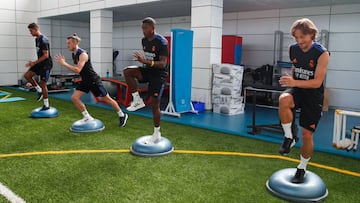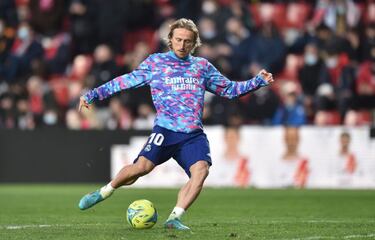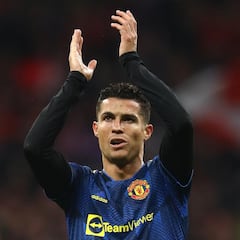The secrets behind Luka Modric's success
AS sat down with Vlatko Vucetic to discuss the physical training he conducts with Real Madrid midfielder Luka Modric.

Luka Modric continues to shine in the Real Madrid midfield engine room and many fans of the club continue to wonder for how long he can continue performing at the highest level for Madrid.
Vlatko Vucetic is a professor at the Faculty of Kinesiology at the University of Zagreb and head of the Centre for Sports Diagnostics, through which hundreds of the country's elite athletes from 50 different specialities pass.
He currently works as a personal trainer for more than twenty professional footballers, including Modric, and also teaches at UEFA A, B and Pro Levels at the Croatian national football coaching academy.
Who is Vlatko Vucetic?
I have my own basic principles in coaching athletes, especially for tennis and football. I was a Croatian champion in athletics, in the middle distance, and for more than 15 years I experienced the process of having to train on a daily basis. I can therefore understand how a player feels after a tough and exhausting training session. Now I work with more than 20 players, some of them veteran, like Luka [Modric], but I also like to train younger athletes.
What is your method like?
It is based on complex diagnostic research. I measure the players with more than 40 morphological parameters, i.e. muscles, bones, and so on. We also talk about daily habits and lifestyle. That's the first thing. We look at body composition, we analyse motor skills for explosiveness, flexibility, jumping, sprinting, agility, and power and strength.
What else do you work on?
Another important parameter is motor intelligence for football, especially for midfielders. How fast they make decisions, how fast they can solve problems. Luka is one of the best in the world at that. He sees the game with an open mind and before he has the ball he has a vision of the pitch quite different from other players. Modric sees three or four different solutions and his brain spontaneously analyses the situation of many players around him, and then he quickly makes a decision. Sometimes he thinks faster than his team-mate so he puts the ball in an area of the pitch where there is nobody running into (laughs).

What does a footballer have to do with you?
We plan from one day to the next. Ten years ago I planned a month ahead, then a week ahead... But in the last 10 years I've been working on a daily basis, because things change quickly. Sometimes with Luka it happens, we change on the fly, or he decides, because we have been working together every day for almost seven years.
Maybe Luka misses training 10 days a year at the most. This summer I sent him a programme to play tennis because he likes it, or exercises to swim in the sea and things like that. He is a hard worker, he is absolutely a player and a person who lives for football, for his team, he is totally different from the rest. He wants to organise the players and wants the team to play well. He is happiest when the team is playing well. And he concentrates on himself and his body, he works every day, sometimes in the morning. Many of my players work immediately after waking up, in their pyjamas, for 15 or 20 minutes. I myself do squats while brushing my teeth. Then push-ups, and so on after waking up. And most of my players do the same. You can work out even when you are sick.
What kind of exercises do you do?
Related stories
Every exercise has elastic bands - the muscle is elastic! For me, for you, for my father, who is 81 years old. For everyone, elastic bands are the best way to train. It's the best way to avoid injury. If you look at Modric's last seven or eight years, he has had almost no injuries. It's because of his preparation, because he's focused on training, focused on injury prevention, and focused on lifestyle.
Can you play until you're 40?
Training the way Modric does and following a nutritional plan, like Cristiano Ronaldo or Zlatan Ibrahimovic and other players, you can. They are footballers who really focus on their bodies.


